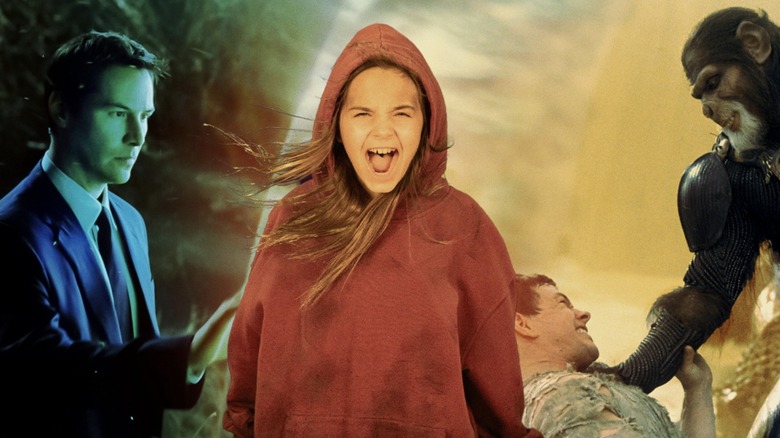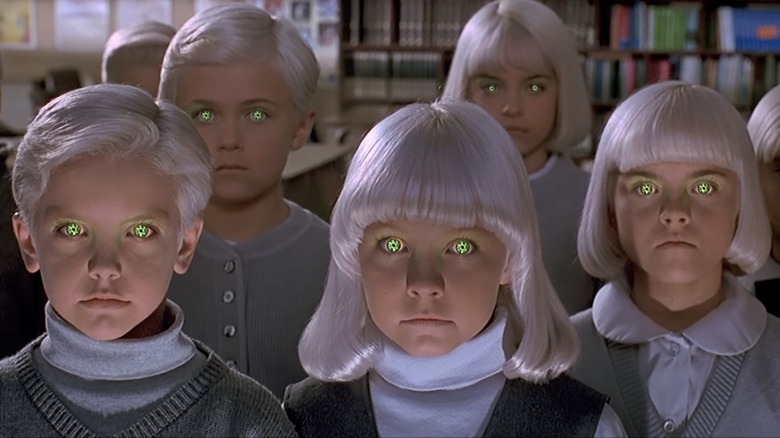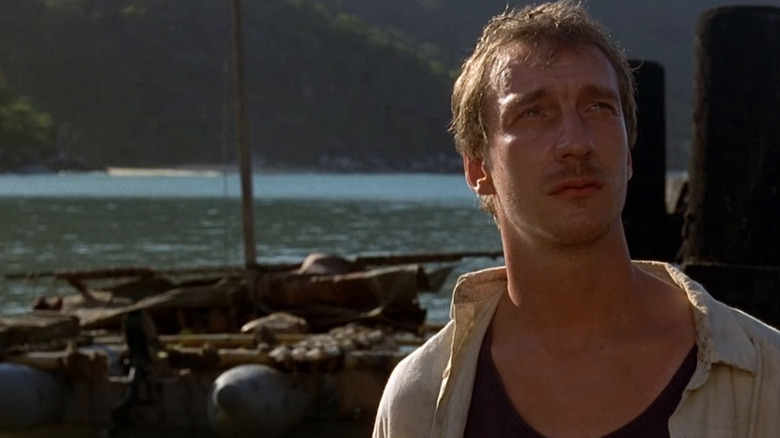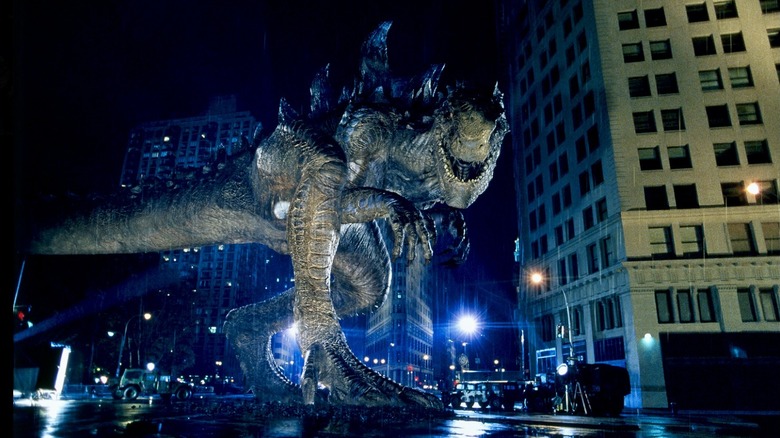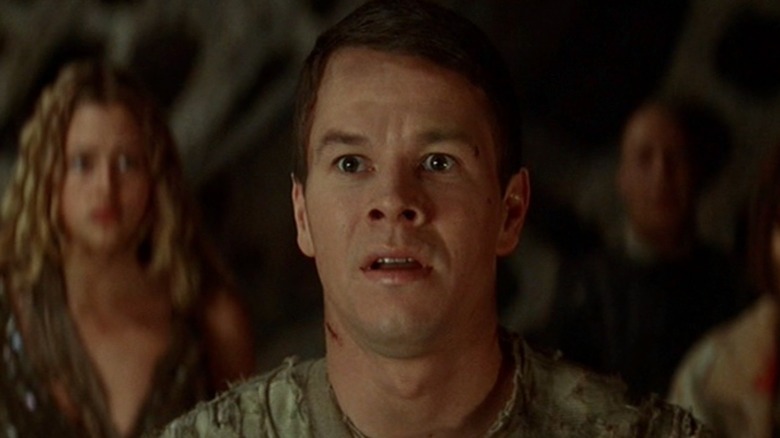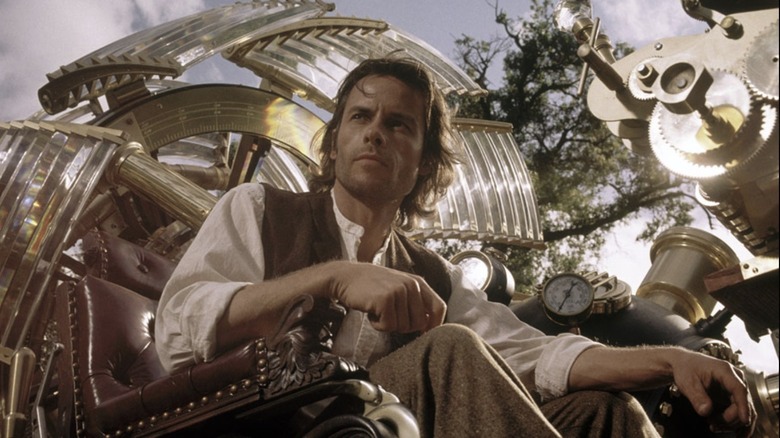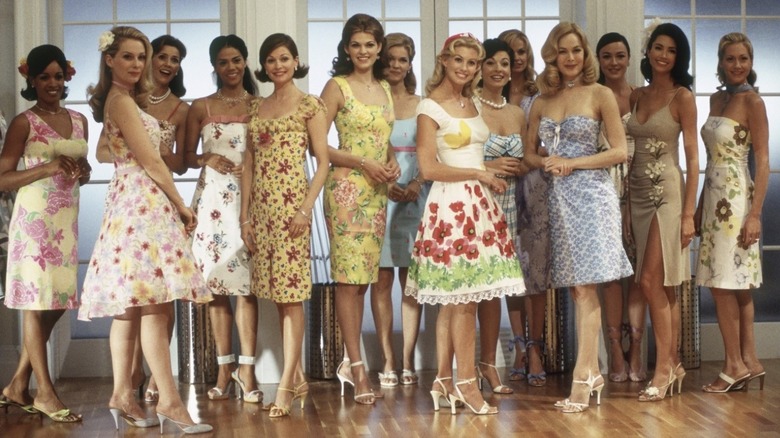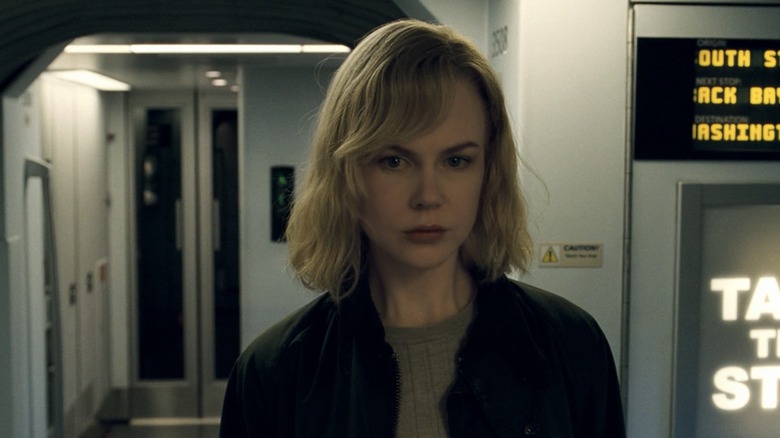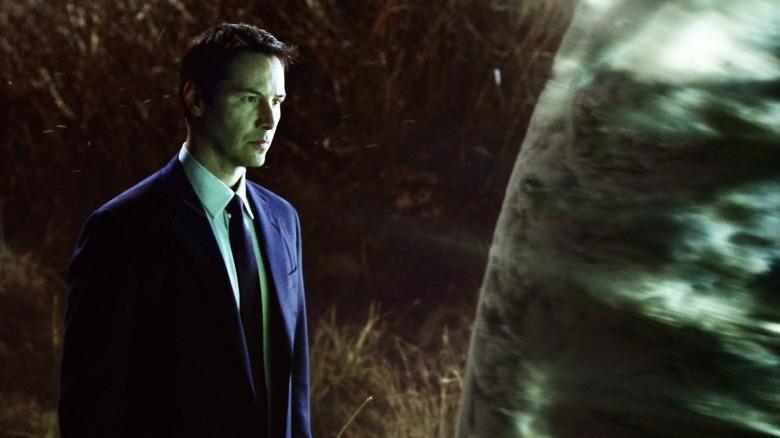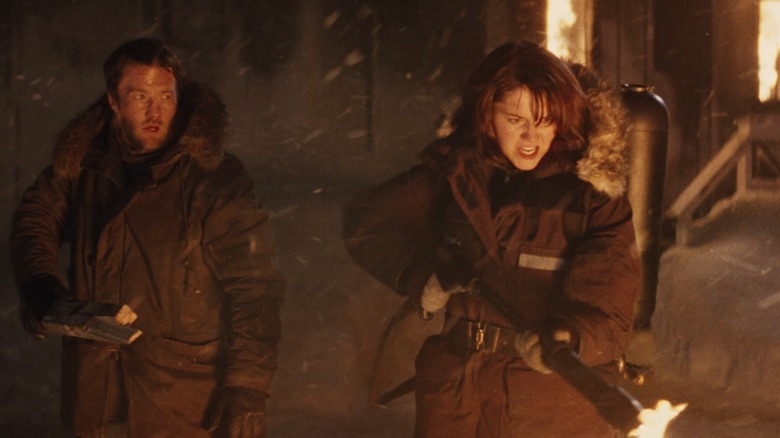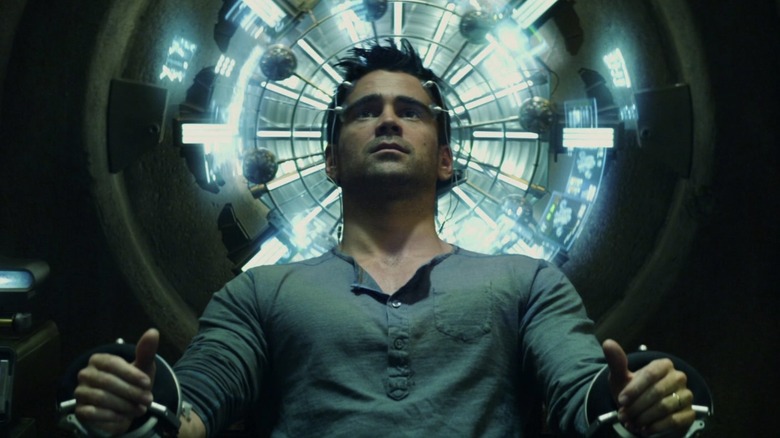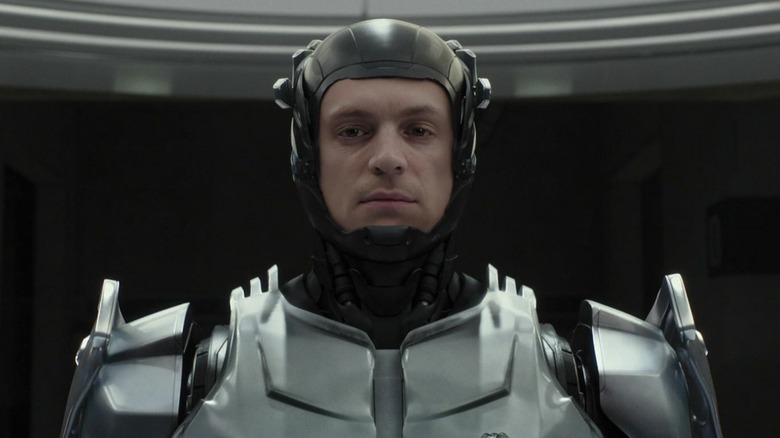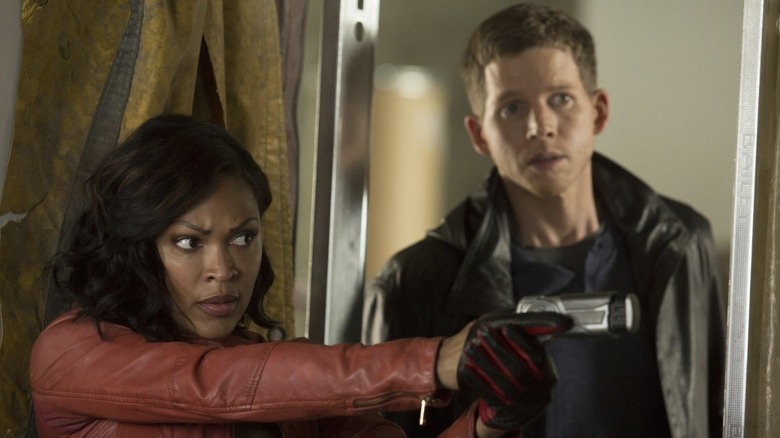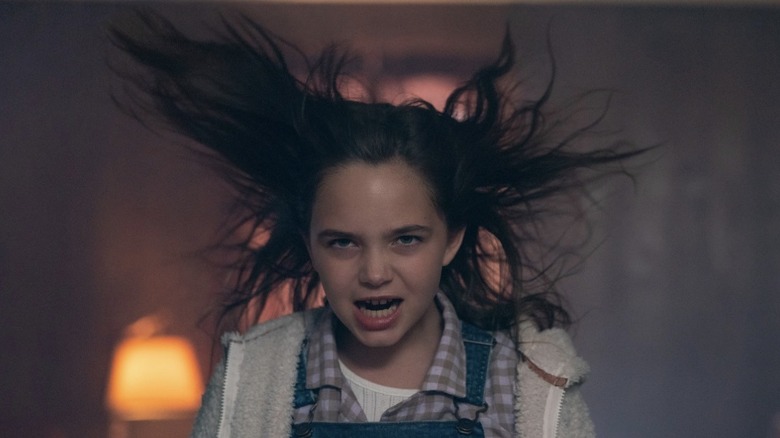The Worst Sci-Fi Remakes Of All Time
As practical special effects and CGI have evolved, we've seen some of the best sci-fi movies of all time resurrected from the cinematic graveyard. Now that our technology can better recreate what writers' imaginations have envisioned for hundreds of years, why wouldn't we remake classic sci-fi stories of substance with modern production values and special effects? On the surface, this seems like an obvious choice, but remaking a beloved classic or cult favorite is tricky. How do you make a respectful interpretation that existing fans will enjoy while having something fresh to say about the themes explored in the original?
Can you ever successfully adapt stories from other eras for our current cultural moment while introducing the basic story and themes to a new generation? While some remakes, such as John Carpenter's 1982 cult classic, "The Thing," or Denis Villeneuve's "Dune" have lived up to the original, other remakes have left audiences wondering why these filmmakers even bothered. Some remakes are minor misfires, while others are absolutely epic disasters. Join us as we reflect on the worst sci-fi remakes of all time.
Spoilers ahead!
Village of the Damned (1995)
The 1960 film was based on the 1957 novel about a small English village where everyone loses consciousness when a mysterious silver object arrives. After the object leaves, they awaken unharmed, but they soon learn that all the fertile women in the village have become pregnant. When they give birth, the strange alien Children have platinum blonde hair, are disturbingly unemotional, grow at a faster rate, and possess frightening telepathic and telekinetic powers.
The 1995 John Carpenter remake transplants the village from England to modern-day, rural northern California. With Carpenter at the helm, one would expect this remake to be on par with "The Thing," but this 1995 version of "Village of the Damned" doesn't come close to the original. In fact, it was nominated for a Razzie and has terrible scores on Rotten Tomatoes. Although the children are still unsettling in the remake because of their emotionless and visual uniformity, the adults were miscast, including Christopher Reeve, Kirstie Alley, and Mark Hamill.
While the original film still has excellent scores on Rotten Tomatoes, was well-acted, and created an eerie vibe by playing with people's innate fear of the unknown, the mid-'90s remake is poorly acted and lackluster. Carpenter failed to bring anything socially relevant or original to the story. The icy glowing eyes from the 1960 film were so effective, they didn't need a remake with technicolor eyes. This remake feels as pointless as Gus Van Sant's color knock-off of "Psycho."
The Island Of Dr. Moreau (1996)
The 1977 version of "The Island of Dr. Moreau" admittedly wasn't anything special, although it featured respectable performances from Burt Lancaster and Michael York. It has sub-par ratings on Rotten Tomatoes, and the dated 1970s special effects made it an excellent candidate for a modern remake. There have been many adaptations of H.G. Wells' sci-fi novel exploring questions about the ethics of genetic engineering while asking us to ponder the distinction between man and beast.
The 1996 remake starring Marlon Brando as Dr. Moreau, Val Kilmer as Montgomery, and David Thewlis as the shipwrecked interloper David, seemed so promising. Somehow, it turned out worse than the earlier version when the production devolved into chaos. Although the film can be credited with excellent makeup and prosthetic effects — honestly, they are the only reason to see the film — the plot is a mess and the acting is questionable.
Much of the film's failures can be blamed on the beleaguered production, which included a director change and rumors of on-set drama and difficult stars. The original director, Richard Stanley, snuck back on set disguised as a mutant dog to see what had become of the film he'd wanted to make since he was a boy, telling Vice, "It was soul destroying." The 1996 remake has awful Rotten Tomatoes scores, was one of the biggest cinematic disasters of all time, and was a financial flop.
Godzilla (1998)
Roland Emmerich's 1998 "Godzilla" was the first American incarnation of the Japanese sci-fi franchise, but it was a big disappointment for fans of the classic franchise. The original 1954 sci-fi film was an allegory for the destruction of nuclear war, something that was prescient in Japan after the bombing of Hiroshima and Nagasaki killed hundreds of thousands and ended World War II. Although the franchise moved in a cheesier direction, the underlying theme was still there.
Coming off their success with "Independence Day," Emmerich and screenwriter Dean Devlin envisioned an American remake as a family-friendly summer blockbuster, '90s style. They kept the nuclear mutation, but Godzilla lost its humanity, and sense of humor. The result is a middling blockbuster, but as a "Godzilla" remake, it is abysmal, and the Rotten Tomatoes scores reflect it. It bombed at the box office during its Memorial Day opening weekend and was popular at the Razzies, getting five nominations. Per Den of Geek, after the poor public response, Sony canceled plans for a trilogy and Toho took back the licensing rights.
Per Vulture, Kenpachiro Satsuma, a Japanese actor who once played Godzilla, reportedly walked out of the Tokyo premiere, saying, "It's not 'Godzilla,' it doesn't have the spirit." Another common complaint, of course, was that this new monster looked nothing like the earlier versions, despite surpassing previous films in the special effects department. It feels like someone crossbred "Godzilla" and "Jurassic Park," birthing a soulless dud that even Matthew Broderick's charm can't save.
Planet of the Apes (2001)
Tim Burton's 2001 disasterpiece, "Planet of the Apes," looks better than the earlier films, but that's all this remake has going for it. The remake takes us back to the beginning of the "Planet of the Apes" franchise and the Pierre Boulle novel that inspired the 1968 movie starring Charlton Heston. Despite the excellent production design and cinematography, this remake loses franchise fans immediately when Captain Leo Davidson (Mark Wahlberg) meets the inhabitants of this strange world.
It startles Davidson that the Apes wear battle regalia and talk, but in this version, the humans also talk, making Davidson far less unique than Heston's character in the original film. The 1968 film was an allegory for civil rights, and the writing was witty and nuanced. This remake reframes the story as an animal rights allegory, which is an adequate update, but it lacks the humor of the original film and the dialogue suffers.
The 2001 remake of "Planet of the Apes" was a major misfire that didn't do justice to the original film. While not all the '70s movies in the franchise are high-quality films, when the TV documentaries about the making of the 2001 remake get better ratings than the remake itself, you know you've got a dud. The 1968 film still has "fresh" scores on Rotten Tomatoes, was nominated for two Oscars and John Chambers received an honorary Oscar for make-up, while critics declared the remake rotten and it was also nominated for three Razzies.
The Time Machine (2002)
H. G. Wells' great-grandson, Simon Wells, directed a film adaptation of his great-grandfather's sci-fi novella, "The Time Machine" in 2002. Although the remake improved upon the special effects from the 1960 version, the earlier movie actually won an Oscar, while the remake did not. The 2002 film seemed promising, which is framed as a haunting story about love lost, but it quickly devolves when Alexander Hartdegen (Guy Pearce) travels into the future after realizing he can't save his fiancé, Emma (Sienna Guillory), from dying in the past.
The 1960 movie followed the plot of the novella closely, only diverging significantly when H. George Wells (Rod Taylor), the scientist who made a time machine, returns home to London rather than vanishing into time. The 2002 remake differed from the book, transplanting the story to New York, and centering a shattered Moon after human colonization as the downfall of modern life. The remake suggests our technology might lead to our downfall, rather than nuclear annihilation, as the 1960 film warned.
Both films included the distant future and the struggle between the Eloi and the Morlocks, but the 2002 remake fails to generate any palpable suspense, despite the abundant action sequences in the second half of the film. The 1960 film still has respectable scores on Rotten Tomatoes, while the remake's scores are awful. This remake is all style and little substance, relying too heavily on the special effects and not enough on developing the story and characters.
The Stepford Wives (2004)
A "Stepford Wives" remake seemed so promising, and Frank Oz's 2004 version starring Nicole Kidman, Bette Midler, and Matthew Broderick only improved on the production values of the original 1975 film, which made it an obvious choice for a remake. The 1972 novel and both films follow Johanna, Walter, and their two children when they move to the idyllic town of Stepford. Although the town is peaceful, Johanna quickly realizes she doesn't fit in with the oddly vacant women of Stepford.
The 1975 film and novel explore characters living during the height of the women's liberation movement, who are pushing against the confines of being homemakers when they have other ambitions. While the 2004 remake takes place after the women's movement, following a group of women who are actually being forced back into the home after attaining success as CEOs, executives, and scientists. The story changes intended to modernize the themes don't quite work.
The biggest failure of this poorly rated remake is that the campy comedy comes across as absurd and heartless, rather than darkly funny as the satirical original film did. Oz's glossy remake extinguishes the sinister vibe and emotional resonance of the 1975 film, which wasn't perfect, but still has decent ratings on Rotten Tomatoes. The happy ending of the 2004 remake feels forced and completely eclipses the original film's unsettling ending, which resonated with the tone of the film.
The Invasion (2007)
The 1978 remake of "Invasion of the Body Snatchers" is arguably one of the best sci-fi remakes of all time, and the excellent Rotten Tomatoes scores reflect the quality of the film. When they made a modernized remake in 2007, the competition was stiff. "The Invasion" has a solid cast starring Nicole Kidman and Daniel Craig, and some excellent action sequences, but it is the weakest of the four films, based on the 1955 novel by Jack Finney, about aliens coming to Earth and taking over the bodies of your neighbors.
The 2007 remake sets the stage for the invasion as global, rather than an individual community as the previous films did, and there aren't any pod people; just spores that infect humans, leaving them emotionless and lacking individual personalities. The update feels more like an action flick than a thought-provoking sci-fi film, while still edging into horror territory as the earlier versions did.
Like the earlier films, "The Invasion" explores themes of forced assimilation, and mind control, and relies heavily on paranoia to raise the tension. "The Invasion" got poor scores from critics and audiences on Rotten Tomatoes and was a box office flop. It isn't the worst film ever, but it's the weakest film in this previously solid franchise. Much like its predecessors, this film reflects the fears of the period it was made but suffers from reducing the once frightening alien invasion to a boring virus you must stay awake to not succumb to.
The Day The Earth Stood Still (2008)
We must give the 2008 remake of "The Day the Earth Stood Still" props for the special effects, which are obviously better than the original 1951 film, but the original didn't set a high bar in the effects department. This modern update starring Keanu Reeves and Jennifer Connelly just doesn't live up to its Cold War predecessor. The 1951 film, based on Harry Bates' 1940 short story, still has excellent "fresh" scores on Rotten Tomatoes, while the 2002 remake's scores are abysmal.
Changing the looming threat from nuclear annihilation, which resonated with the Cold War era when the first film was released, to ecological devastation was the perfect update, giving this classic story to a more prescient modern threat. The concept held so much promise, but unfortunately, the story lacked focus and the characters weren't developed. The film is as emotionless as Reeves' Klaatu, making it difficult for the audience to empathize with anyone. If you can't root for anyone, it's hard to care the world is ending.
The 2008 remake of "The Day the Earth Stood Still" feels like a disappointing missed opportunity. If only the script had been better, the excellent supporting cast, including Kathy Bates, John Hamm, and John Cleese, would have had something to work with. The message of caring for our world rather than polluting it and reigning in our penchant for militarism is a bit on the nose and lacks the nuance of the original film.
The Thing (2011)
2011's "The Thing" was technically a prequel exploring what happened to the Norwegian scientists before the events of Carpenter's 1982 masterpiece, but the movie feels like a pointless remake. Although it's nice to have a couple of women in the mix and have the film pass the Bechdel test, as well as casting Scandinavian actors to play the Norwegian scientists, the story resembles the 1982 film so closely that it feels derivative.
This isn't entirely the fault of the 2011 film's production team. The location and the way the alien duplicates its victims don't allow much room for differentiation. Per IGN, the film's production team praised Carpenter's iteration at New York Comic Con, and their reverence for the 1982 cult classic is clear in how they painstakingly recreated the Norwegian camp. The problem is they simply left no room for their film to have its own personality or something fresh to say.
If you are a fan of Carpenter's movies, you already know how this prequel ends. The survivors of the Norwegian camp pursue the alien dog to the American camp where they die trying to kill it, thus kicking off the action of the 1982 film. A successful prequel must shed light on the backstory in a way that makes you look at the first film with fresh eyes, ideally revealing something new about the alien. The 2011 film failed to do this and instead told a similar story that the 1982 film did better.
Total Recall (2012)
Although the 2012 remake of "Total Recall," starring Colin Ferrell, has some great action sequences and looks fantastic, it lacks the humor that made the 1990 movie so enjoyable. Ferrell is arguably a more talented actor than Arnold Schwarzenegger, but Schwarzenegger brought something playful to the character that made the original film fun. This is reflected in the two film's scores on Rotten Tomatoes. The 1990 original has a "fresh" rating and won a special achievement Oscar for visual effects, while the remake has poor scores with critics and audiences.
The supporting cast of the remake is solid, with much bigger stars in key roles, but the movie lacks some ineffable qualities the original film had. There are a few callbacks to the original movie that are fun, but no trip to Mars and no alien artifacts are in the remake. Instead, the conflict in the film is about growing tensions between the two habitable regions left on Earth, Great Britain, and the marginalized Colony on the Australian continent.
The 2012 film makes a statement about rich nations and poor nations competing for diminishing resources, but having to pay for air on Mars was a more visceral and personal exploration of the themes. Despite taking itself more seriously than the original, the remake isn't nearly as thought-provoking or engaging. Both films play with identity, memory, perception, and questioning what is real, but the original movie is more entertaining.
RoboCop (2014)
The original "RoboCop" was a social satire of corporate culture. The 1987 film garnered excellent "fresh" scores, was nominated for two Oscars, and won a special achievement award. It seems the 2014 "RoboCop" reboot was conceived of by someone who missed the satire and humor of the original film or simply didn't want to emulate it. The remake includes media breaks as the original film did and attempts to make a statement about the influence corporations have on contemporary politics, but it isn't as witty as its predecessor.
Yeah, it looks good and attempts a thoughtful commentary about how our emotions distinguish us as humans, amidst AI technology, but it's clumsy compared to the original film. No offense to Joel Kinnaman, who was absolutely fantastic in "The Killing," but he can't touch Peter Weller's emotionally riveting performance from the original film. While the remake has a solid supporting cast including Gary Oldman, Michael Keaton, and Samuel L. Jackson, it just doesn't capture the subversive spirit of the original film.
The characters don't feel as fleshed out in the 2014 remake as they did in the original. For example, the emotional connection between Murphy and his partner, Jack Lewis (Michael Kenneth Williams), doesn't hold a candle to Officer Anne Lewis (Nancy Allen) and Murphy's bond in the original film. The film spends too much time exploring the science that transformed Murphy, that the rest of the film feels rushed, sacrificing character development. This is reflected in the Rotten Tomatoes scores.
Minority Report (2015)
Steven Spielberg's "Minority Report" was a futuristic, thought-provoking sci-fi film exploring the ethics of law enforcement and the nature of free will. On the eve of going national, the lead investigator of an experimental police unit called Precrime, has second thoughts about their techniques after the tables have turned and Chief John Anderton (Tom Cruise) is pursued for a crime he hasn't committed. In his efforts to prove himself innocent, Anderton stumbles on a secret that derails Precrime.
The 2015 Fox series follows Dash (Stark Sands), a former precog who is haunted by the murders he sees. He teams with Detective Lara Vega (Meagan Good) and they try to stop these future crimes. The series brings nothing original and fails to explore the moral complexities of the film. Although it's refreshing to see a diverse cast, with a Black woman in the lead, the "Minority Report" series is a middling police procedural dressed up in sci-fi trappings. It lacks the intellectual intensity and emotional depth of the original film, which garnered exceptional "fresh" scores on Rotten Tomatoes, and one Oscar nod for its compelling yet dystopian vision of the future.
Firestarter (2022)
Stephen King's genre-blurring "Firestarter" was ripe for a remake. This strange tale about a little girl named Charlie McGee, who must contend with her destructive pyrokinetic powers, is the type of subtle sci-fi that gets under your skin, feeding off paranoia and distrust of government institutions. Charlie inherited this terrible power because, long before she was born, her parents participated in a scientific experiment, bearing striking similarities to the CIA's MK-Ultra. The Shop, a shadowy governmental organization, conducted this experiment.
Although the 1984 Drew Barrymore-led version of the film isn't perfect, it boasted great special effects, a solid performance from its young star, and the entire supporting cast. It didn't win critical acclaim or commercial success, but it was easy to see the potential for a fantastic remake in the bones of the story. Unfortunately, we didn't realize how good the original "Firestarter" was until there was another version to compare it to and the 2022 remake didn't improve upon the original's special effects and looks cheap.
The remake brings in an interesting twist by making Rainbird (Michael Greyeyes) Indigenous and with a backstory of being experimented on by The Shop himself, but ultimately the remake doesn't do justice to one of King's most underrated novels. The acting isn't nearly as good as the original film, but the script is limiting and doesn't give them much to work with. Despite the inflammatory themes, the film builds no tension and its scores on Rotten Tomatoes reflect that failure.
